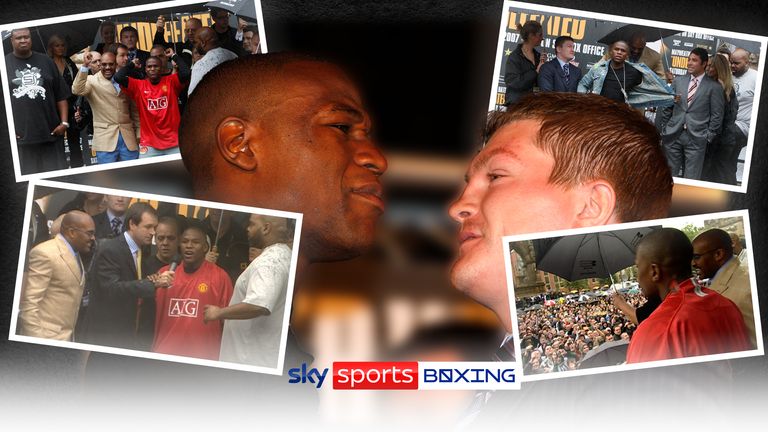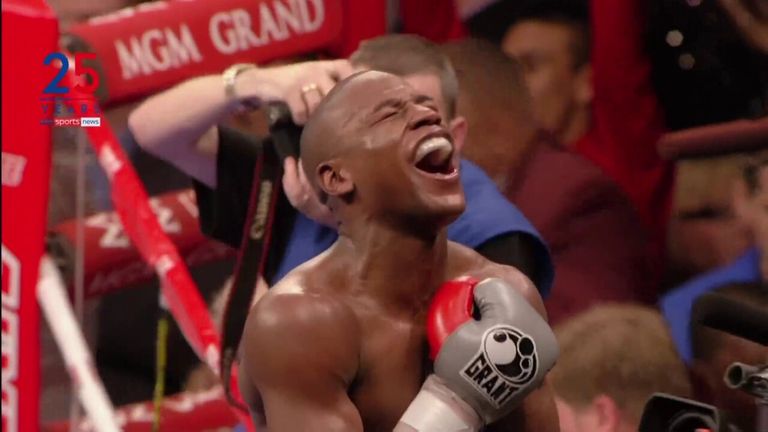In 2007, when Ricky Hatton fought Floyd Mayweather, Las Vegas was the unrivalled capital of boxing. The best fighters in the sport took up residency there. But it had never seen anything like Ricky Hatton’s takeover of the desert city.
Somewhere between 20,000 and 30,000 Hatton supporters travelled to the Strip for the event, even though the venue that would host the fight, the MGM Garden Arena, only had a capacity of just over 16,000.
By midweek, even at 4am, the chants of his fans were still echoing through the corridors of the MGM.
Hatton had built an incredible fanbase as he had risen through the UK boxing scene and become the super-lightweight world champion. His popularity snowballed when the British phenomenon came to America.
Hatton had his first fight in the US, and stepped up to welterweight for the first time, when he beat Luis Collazo to win a world title in a second weight class in 2006. He had two bouts in Las Vegas ahead of Mayweather and made an impact with the stunning body shot he used to knock out Jose Luis Castillo.
That win fuelled confidence that Hatton could not only take on Mayweather but beat him. Castillo had troubled Mayweather, and Hatton with greater strength and that aggressive approach, it seemed, could do the same.
Mayweather and Hatton were the perfect contrasts in boxing styles and outsize personalities. The American was a superstar, who had beaten Oscar De La Hoya to take on the mantle of the pound-for-pound king of the sport. He flaunted his vast wealth, throwing fistfuls of cash at Hatton in the build-up to the fight. Mayweather heckled him at any opportunity.
He played the villain expertly while Hatton was down to earth, witty and virtually impossible to dislike.
Neither had lost before, and Mayweather never would. Their combination made for the most memorable night of either man’s career.
The atmosphere at the weigh-in alone reached a fever pitch. Marshalling the electric noise, Hatton was fired up, perhaps too fired up, as he led the chants of the crowd. Mayweather seemed uncomfortable and the feeling that Hatton could rattle him was growing ever stronger.
The fight night itself was a heady mix. Celebrities, Denzel Washington and Brad Pitt among them, in touching distance of boxing greats, Sugar Ray Leonard and Tommy Hearns, all overwhelmed by the wall of sound from Hatton’s raucous British supporters.
Hatton did bring the best out of Mayweather, creating a better spectacle than even legends like Canelo Alvarez, Miguel Cotto and Manny Pacquiao managed.
The Mancunian looked to walk through Mayweather’s punches and apply unrelenting pressure like he had against Kostya Tszyu, Hatton’s finest victory.
He kept in touch in the first half of the contest, but was disrupted by what he perceived as referee Joe Cortez’s over-eagerness to call break when they were on the inside. Hatton was convinced it was stopping him from boxing where he wanted to take the fight, up close where he could use that renowned body attack.
“Traditionally I get stronger as the fight progresses. Because of the referee breaking my rhythm I tired quicker than usual. That is something that will always make me wonder ‘what if?'” Hatton told Sky Sports.
He was the one who grew disrupted and ragged. He was shipping punishment.
Then Mayweather landed one of the most famous punches of the 21st century.
His check hook intercepted Hatton as the Briton charged forward. It was a touch of brilliance. That marvellously timed left hook sent Hatton careering headlong into a corner-post. It put him down for only the second time in his career.
He rose, but Mayweather sent him back to the canvas as his trainer Billy Graham threw in the towel and Cortez waved off the fight.
Despite the crushing loss, Hatton’s trademark sense of humour was apparent in the immediate aftermath.
“What a fluke that was!” he quipped while still in the ring.
That showcase for Mayweather underpinned the enduring admiration for and interest in his career, that remained at a stratospheric level of stardom, culminating in his 2015 superfight with Pacquiao, the most lucrative of all time.
For Hatton the result against Mayweather never diminished his standing. His fame and the affection the public had for him only grew from it. No one felt like Hatton had let them down. But that loss wounded him.
“It was my first defeat in 43 fights. I had 75 fights as an amateur, winning 72. I won eight national amateur titles, I boxed for England at every level. I won British and world titles but, all of a sudden, I got beat. I wasn’t used to it,” he said.
“I didn’t just turn up for my biggest payday. I genuinely, genuinely thought I was going to beat him. When I didn’t, things went south for me. I was devastated. I felt I hadn’t been given a chance. Bit by bit, it sent me sideways.”
Hatton would become an ambassador for a mental health charity and spoke openly about his struggles, in order to help others experiencing similar problems.
“It [his depression] was always there from day one. I think after the Mayweather fight it triggered,” he said. “The Mayweather fight came, and I felt like I’d let the country down. I told everyone I was going to win, and I didn’t. I couldn’t leave the house.
“Everybody knows about my mental health. But I don’t think anyone knew in-depth how bad it was.”
It was his biggest fight – no one but Hatton could break British pay-per-view records at five o’clock in the morning – and showcased so much of what his supporters loved about him: his courage, his determination, his charm and his humour. And even though he did not win, he also showed he could mix proudly with the greats.
Hatton later reflected: “Deep down, when I see some of [Mayweather’s] performances against Saul ‘Canelo’ Alvarez, Miguel Cotto and other great fighters, I pushed him the most.
“Manny Steward [the legendary Kronk trainer] had it level after five rounds – and that’s even with the referee breaking me. I moved up a weight and I was one of his toughest fights.
“That’s good enough for me.”








